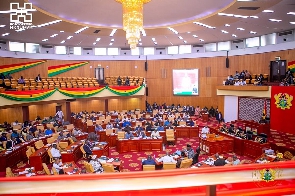The Africa Education Watch (Eduwatch) has petitioned Parliament to question the Finance Minister, Ken Ofori Atta, on the Ghana Education Trust Fund (GETFund) capping method of affirmation or formula as it deviates from the GETFund Law 2020, (Act 581) and the Earmarked Funds Capping and Realignment Law 2017 (Act 947).
This petition is against the backdrop of a sharp decline in the budgetary allocation to the only statutory fund available for educational infrastructure provision in the country.
According to the civil society organisation (CSO), the 2023 Budget Statement indicates that despite an increase in the total accrual to the get GETFund levy to a record GH₵4.6billion, for the first time, only GH₵1.8billion, representing 39 percent of the GETFund Levy accrual was allocated to the fund to finance education projects and activities.
This, the CSO laments, is inconsistent with the law; hence, the need for the Parliament to question the Finance Minister’s modus ponens for allocating only 39 percent of total accruals as against 60 percent and 81 percent in the 2021 and 2022 budgets respectively.
“Under the Earmarked Funds Capping and Realignment Act, 2017 (Act 947), GETFund was capped at 25 percent; but historically, allocations have been in the region of 60 percent and above. Using the same parameters of this same minister, we estimate that at least GH₵2.7billion, representing 60 percent of the total 2022 GETFund Levy accruals of GH₵4.6billion should be allocated to the fund for 2023.
“The continuous decline in the allocation to the GETFund, amid consistent increment in the GETFund Levy, remains a serious worry for stakeholders concerned about the widening infrastructure gap in the education sector, especially at the basic education level,” Executive Director, Kofi Asare said.
Implications of capping infraction, among others
According to Eduwatch, the implications of the minister’s action are that the widening infrastructure gap in the education sector, especially at the basic level, will continue to increase; and it would take several decades to address.
Currently, there are over 5,000 schools existing under trees, sheds, and dilapidated structures, and another 4,000 Junior High Schools are needed for primary schools without such continuation infrastructure. Meanwhile, 1.2 million children are not in basic school due to the lack of public basic schools in underserved communities, among others.
“This action constricts the realisation of the objectives of the government’s free Compulsory Universal Basic Education under section 38(2) of the 1992 Constitution of Ghana,” he added.
The clarion calls
The Executive Director of Eduwatch stressed that as Parliament prepares to consider the appropriation estimates for the education sector, the CSOs are drawing the attention of the House to the requirements of 25 percent capping of realignment law, viz. the 61 percent of GETFund levy accruals being reallocated to other sectors, leaving only 39 percent for allocation to the fund.
“Eduwatch calls on Parliament to reject the allocation and cause the Minister of Finance to review the weights applied in allocating the GETFund, in line with the Earmarked Funds Capping and Realignment Act, 2017 (Act 947),” he concluded.
GETFund capping history
In the 2019 Budget Statement, out of a GETFund levy accrual of GH₵1.8bn, GH₵1.2bn – representing 66 percent – was allocated to the fund, in line with the Earmarked Funds Capping and Realignment Law.
Also, in 2020, out of the GH₵2bn accrual, GH₵1.2bn – representing 60 percent – was allocated to the fund.
Furthermore, in the 2021 Budget Statement, out of the GH₵2.3bn, GH₵1.4bn – representing 60 percent of accruals – was allocated, in line with the capping and alignment law.
Fast forward, to the 2022 Budget Statement, GH₵2.6bn of the GH₵3.2bn accruals were disbursed, representing 81 percent. However, in the 2023 Budget Statement, the ministry surprisingly decided to release only GH₵1.8bn of the GH₵4.6bn, representing a meager 39 percent – far from what the capping and realignment law stipulations.
Business News of Tuesday, 20 December 2022
Source: bftonline.com













